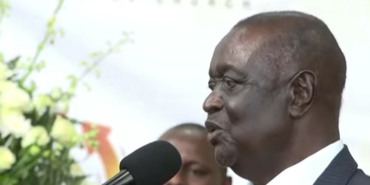Kenyans Lose Millions as Fraudulent ‘Blessing Lotteries’ Exploit Religious Viewers

The proliferation of digital television stations in Kenya, now exceeding 359, has been marred by a troubling trend: the exploitation of religious programming for financial gain.
A significant number of religious broadcasters are accused of leveraging faith to operate fraudulent gambling schemes that prey on vulnerable Kenyans. At the centre of this controversy is Yahweh's Media Services Limited, a Nairobi-based religious broadcaster allegedly orchestrating a large-scale fraud targeting the country’s most financially insecure citizens. Operating from K-Mall, near Kangundo Road, the organisation, led by self-proclaimed "prophet" David Maina (also known as Karuru and Kagechu), controls multiple television stations—including Jawabu TV, Madhabahu TV, Yahweh’s TV, and Shahada TV.
These stations promise viewers miraculous financial rewards in exchange for mobile money transfers, a deceptive practice that masks a predatory gambling operation. Investigations reveal that these religious stations masquerade as charitable entities, using televised games of chance disguised as faith-based blessings. Former employees and whistleblowers have described an operation that thrives on the desperation of impoverished viewers, manipulating them through emotional appeals and technical deceit.
During broadcasts, anonymous presenters interrupt religious programs to promote "blessing lotteries." The scheme promises substantial financial returns for small monetary contributions. However, insiders confirm that these draws are rigged, with no genuine winners. Paid employees often pose as ecstatic recipients of divine financial intervention, fabricating the outcomes.
Secret recordings obtained by investigators expose the presenters openly mocking victims off-air, deriding their gullibility while urging them to send more money. One recording captures an individual jokingly referring to the deception as “wizi ninakufunza”—Swahili for “I’m teaching you theft.” Another presenter boasts about the scheme’s profitability, stating, “these are the hours we make money.”
The presenters' confidence stems from years of operating with impunity, exploiting regulatory gaps that have allowed them to continue unchecked. Once viewers send initial payments, typically ranging between Sh10 and Sh50, they are pressured to send even more, falsely believing they are on the verge of receiving substantial rewards. This cycle of deceit preys on financial desperation, pushing many into crippling losses.
The consequences of these fraudulent schemes are devastating for many Kenyans. Ms. Ruth Wanjiku, a grandmother from Kikuyu, was drawn in by the promise of winning Sh10,000 after sending Sh10. Within an hour, she had lost over Sh6,000—a significant sum for someone struggling with illness and financial insecurity.
Similarly, Joseph Ng’ang’a, a widower who had set aside money for his children’s school fees, gambled it away through the deceptive broadcasts. Hoping to secure Sh40,000, he lost everything instead. “I just wanted to win, but I ended up with nothing,” he lamented.
According to whistleblowers, these tragic cases are by design. No genuine winners exist—only actors hired to play the role of jubilant recipients during live broadcasts. The money viewers send never circulates back into the supposed game; instead, it is swiftly withdrawn by the perpetrators, leaving participants trapped in an endless cycle of hope and loss.
The fraudulent scheme relies on psychological manipulation, deliberately targeting low-income viewers who lack access to alternative digital entertainment. The TV stations attract audiences by broadcasting dubbed action movies, seamlessly inserting gambling segments throughout. Presenters deliberately craft emotionally charged narratives to exploit viewers’ vulnerabilities.
The promises range from miraculous debt relief to divine healing: “If you have a sick child, send Sh50 and receive Sh50,000.” Such statements are scripted and strategically designed to appeal to Kenya’s most desperate.
The scheme capitalises on rising economic hardships, soaring unemployment rates, and inflationary pressures. Many victims, facing financial distress, turn to these promises in an attempt to ease their struggles, only to be deceived and left worse off. Despite clear violations of ethical and legal standards, Kenya’s regulatory bodies have struggled to rein in the deception.
The Betting Control and Licensing Board (BCLB), the agency responsible for gambling oversight, has admitted that Yahweh’s Media Services Limited does not hold a gambling license. However, attempts to enforce regulations have been repeatedly frustrated by the company’s ability to exploit legal loopholes and constantly evolve its tactics.
The Communications Authority of Kenya (CA), which oversees broadcast content, has also failed to take decisive action, allowing fraudulent religious gambling schemes to operate freely. The lack of enforcement has emboldened perpetrators, allowing them to expand their reach and target even more households.














Add new comment